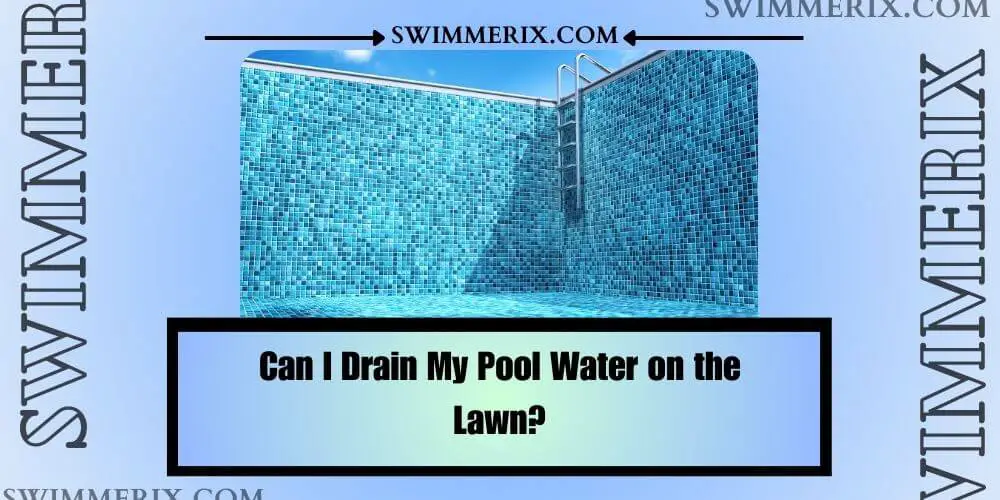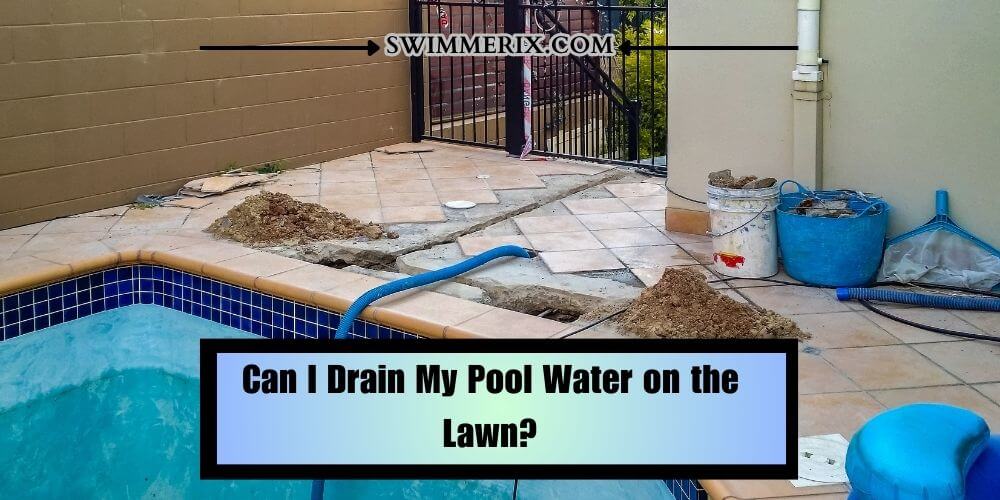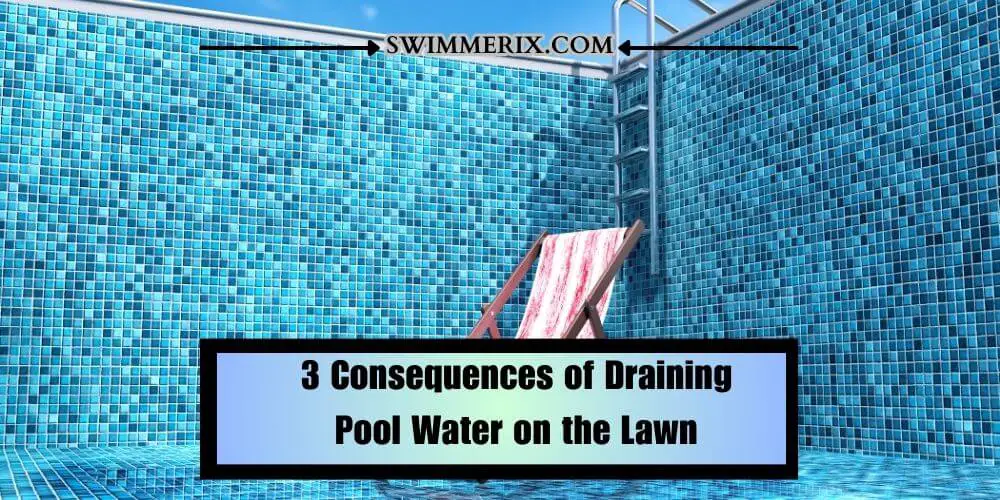
When it comes to maintaining a clean & safe pool for a healthy swimming experience, partially draining is a part of it. When we do this, we often wonder, ‘Can I drain my pool water on the lawn?’.
In this article, I will help you learn the consequences of draining pool water onto the lawn, alternative options, and best practices for pool water management. But before I tell you how you can not waste the pool water & use it efficiently, let’s first find out the answer: Can I drain my pool water on the lawn?
Can I Drain My Pool Water on the Lawn?

No, you shouldn’t drain the pool water on your lawn as it can have various chemicals & contaminate contaminants that may affect the ecosystem. When pool water is released onto the lawn, the substances seeping into the soil affect the groundwater quality & poss a risk to plants & animals.
Awareness of any regulations or local restrictions regarding pool water draining is important. If you have been wondering whether it’s right to drain the pool water onto your lawn as a convenient disposal method, then the answer is ‘you shouldn’t.’
As I told you, draining pool water onto your lawn will have significant environmental implications. A study by the American Chemical Society found that untreated pool water may contain high levels of chlorine, PH imbalances, and other harmful substances like accumulate harmful Escherichia coli and Salmonella, which may threaten the ecosystems, plants, & animal life.
You must check the local regulations & restrictions regarding the drainage of pool water. In such a case, municipalities always have guidelines to protect the environment and maintain public Health.
Therefore if you fail to comply with any of these regulations, you might end up with legal consequences, including fines. Therefore, you must determine whether there are any specific regulations in your area by consulting a local government environmental agency or department that can help you with the right information for permits or alternative methods of pool water disposal. However, there are a few alternatives that you can also consider to dispose of pool water.
2 Alternatives to Consider
Even though draining pool water seems to be a very convenient solution for you, it’s worth exploring a few alternative options that are more environmentally friendly and complex with most regulations.
Pool Water Treatment Options
The best & most effective way to dispose of pool water is to treat it properly. There are a few pool-specific chemicals & additives available in the local market that can help you balance the pool water chemist tree & remove the contaminants from it, making it safe to drain onto any lawn or over flowers.
However, regular testing & maintenance is important to balance the water quality chemistry and ensure it’s safe for the environment before disposal. Consider consulting a pool expert.
Utilizing effective disinfection methods, such as UV or ozone treatment, can help eliminate bacteria & viruses from the water. This ensures that the recycled water is free from harmful microorganisms.
Recycling or Reusing Pool Water
Another eco-friendly option is to recycle or reuse the pool water. This approach is not the best, but it is very helpful in minimizing environmental impact. Also, it will maximize the resources efficiently.
You can use the pool water for repurposing irrigation purposes. You can use the pool water on plants and your lawn as an effective way to conserve freshwater resources while reducing the demand for municipal water supply.
Another thing you can consider doing with pool water is cleaning. There are many cleaning purposes, like washing outdoor surfaces, decks, or even a car. This approach will also help you reduce reliance on potable water for non-drinking purposes.
Plus, it’s a cost-effective solution. I hope you find these alternatives worth exploring & considering. If yes, continue reading to learn the potential consequences of draining pool water on the lawn.
3 Consequences of Draining Pool Water on the Lawn

Before I tell you what the rules & regulations regarding pool water disposal & management are, you must pay attention to the potential consequences associated with the process of draining pool water onto the lawn.
Environmental Impact
As I told you earlier, draining untreated pool water will harm your lawn by introducing harmful bacteria, chemicals, & contaminants into the system, posing a threat to wildlife & vegetation.
Chlorine, in particular, is known to have detrimental effects on aquatic life when it enters streams, rivers, or groundwater. Recent studies discussed in the Journal of Minnesota Pollution Control Agency found excessive Chlorine levels leading to too much algae growth in water bodies to be the leading cause of depletion in dissolved oxygen, negatively impacting aquatic organisms & disrupting the overall balance of our natural ecosystem. Furthermore, the Study highlights the importance of water properly before disposal.
Damage to Vegetation
As I told you earlier, pool water chemicals will harm the vegetation if poured onto the lawn. The high concentration of chemicals in the pool water will severely affect the grass, plants, & trees of your lawn.
Untreated pool water can cause leaf burn and root damage if used for irrigation in certain species. This will not only lead to stunted growth but also the death of plants. To maintain an effective, healthy & thriving lawn, I will advise you to avoid draining pool water directly onto your lawn.
Potential Legal Issues & Fines
Before draining pool water directly on the lawn or any ground, you must consider the local government agency & cleaning department. There are a few local regulations you need to consider. Otherwise, you may end up with legal repercussions.
Municipalities often have guidelines regarding the proper disposal of water & protect the environment. If you want to avoid ending up with penalties & fines, make sure you comply with these kinds of regulations & familiarize yourself with specific rules or regulations in your area. Also, make sure to seek proper authorization or permits.
4 Best Practices for Pool Water Drainage
If it is very important to drain pool water, follow all the best practices to ensure proper disposal and minimize the environmental impact. If not, you must consider the following guidelines to drain & dispose of pool water properly while following all the rules & regulations.
Following Local Regulations & Obtaining Necessary Permits
First, I highly recommend you research, consult, and contact your local environmental agencies or department to determine any local rules & regulations governing water disposal.
Also, ensure you obtain proper permits or any necessary authorization to dispose of pool water into your lawn. By following all the regulations, you can ensure that you are doing nothing wrong & in compliance with the law contributing to a responsible water management practice.
Discharging Pool Water to a Sanitary Sewer System
Another great method considered environmentally friendly & very common is discharging it into a sanitary sewer system. You can easily do this by connecting a hose to a pool drainage outlet & directing the water into the sewer clean now.
However, it could be an efficient use of resources. Plus, it would help if you also took some consideration because discharging pool water into the sewer may sometimes directly lead pool water to water bodies which is generally prohibited. This cannot only cause pollution but also harm aquatic ecosystems.
Hiring a Professional Pool Service for Drainage & Disposal
If you need more clarification about the proper method of draining the pool water or want to ensure compliance with regulations, make sure that you consult with a professional pool service & hire them for effective water disposal.
These experts will not only know but also have experience handling pool water disposal in an environmentally responsible manner. Professional service also guides proper water treatment maintenance & alternate options for pool water reuse.
No doubt their expertise will prove to be a valuable resource for you as they will be helping you discover & navigate the complexity of pool water management while ensuring the best outcome for both your pool & the environment.
Seeking Advice from Local Environmental Agencies or Organizations
Other than consulting a pool service professional, you can also contact local environmental agencies or organizations to clear up any concerns or questions regarding pool water drainage & disposal.
These entities are specialized in environmental stewardship and provide you with the most correct & valuable guide, including resources tailored to your specific location. Pay attention to their consultation, as their expertise can also help you make an informed decision & adopt sustainable practices that align with local regulations & environmental objectives.
| Some Interesting Topics For You Only! |
| Why Does My Pool Smell Like Fish |
| How Soon Can You Swim in a Newly Filled Pool |
| Can You Survive a Tsunami in a Pool |
Conclusion
I hope you know, ‘Can I drain my pool water on the lawn or not.’ Since draining the pool water directly onto your lawn can have a negative environmental impact, it’s best not to do it.
To maintain a healthy pool as well as minimize the environmental impact, proper maintenance & management of pool water is crucial. As I said in the article, you should not drain the pool water on the lawn as it may lead to significant consequences both for the ecosystem & potential legal issues.
To help make a responsible choice regarding pool water drainage, you need to understand the environmental & legal implications, explore alternative options, and follow the best practice.
Also, you can consider consulting professionals & adhere to local regulations for recycling pool water or sustainable water management practices to preserve the Health of our environment.
Now, I hope you have all the information regarding the question: can I drain my pool water on the lawn & if not, what should I do about it? Please check my other helpful guide on pool water management & care. See you in the next post, till then, take care & goodbye.

Hi, This is Josh. I am a former competitive swimmer and current fitness enthusiast.
I created this site to share my love of swimming with the world!
